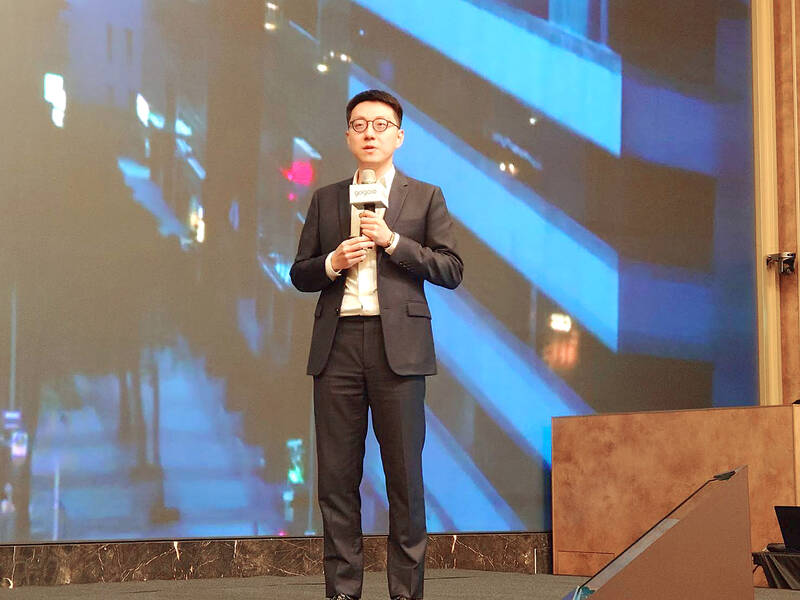Gogoro Inc (睿能創意), an electric scooter and battery network supplier, yesterday said it has signed an agreement with Castrol Holdings to form a joint venture, aimed at making inroads into the Vietnamese electric scooter market, leveraging the British oil company’s local market knowledge.
The joint venture is an essential part of Gogoro’s turnaround efforts by streamlining its overseas expansions and product portfolio, acting chief executive officer Henry Chiang (姜家煒) told an annual media gathering in Taipei.
Gogoro’s goal is to reach a break-even point for its battery business next year and turn a profit in 2028 on a consolidated basis, he said.

Photo: CNA
For the full year last year, Gogoro reported a wider net loss of US$123.2 million, compared with a net loss of US$76 million in 2023.
Regarding its electric scooter business, Gogoro plans to reduce its product lines to five and optimize its platform to shorten development cycles in response to customers’ purchasing behaviors, he said.
On the overseas expansion, Gogoro is making a strategic shift to concentrate its resources on one overseas market at a time, Chiang said.
In addition, Gogoro would team up with local partners to build a foothold, he said, adding that Castrol is a suitable candidate as it has built a strong presence in Vietnam.
That is a major shift in the company’s overseas expansion strategy as Gogoro has been ambitiously trying to create the whole supply chain overseas, aiming to duplicate its domestic success, Gogoro said.
“We now want to play a key role. We do not have to be all-around,” Chiang said.
Under the agreement with Castrol, Gogoro would be responsible for the development of electric scooters and providing battery solutions, while Castrol would handle major business decisions and operation of the joint venture, he said.
The Vietnam project is just the first step, he said, adding that 3 million two-wheelers are sold in Vietnam yearly.
The company is eyeing the massive Southeastern Asia market, which is forecast to grow at an annual rate of 30 percent from this year to 2030, Chiang said, citing a McKinsey & Co forecast.
“Southeastern Asia is a market Gogoro cannot miss out on,” he said. “The electric-vehicle market is taking shape there.”

A proposed 100 percent tariff on chip imports announced by US President Donald Trump could shift more of Taiwan’s semiconductor production overseas, a Taiwan Institute of Economic Research (TIER) researcher said yesterday. Trump’s tariff policy will accelerate the global semiconductor industry’s pace to establish roots in the US, leading to higher supply chain costs and ultimately raising prices of consumer electronics and creating uncertainty for future market demand, Arisa Liu (劉佩真) at the institute’s Taiwan Industry Economics Database said in a telephone interview. Trump’s move signals his intention to "restore the glory of the US semiconductor industry," Liu noted, saying that

On Ireland’s blustery western seaboard, researchers are gleefully flying giant kites — not for fun, but in the hope of generating renewable electricity and sparking a “revolution” in wind energy. “We use a kite to capture the wind and a generator at the bottom of it that captures the power,” said Padraic Doherty of Kitepower, the Dutch firm behind the venture. At its test site in operation since September 2023 near the small town of Bangor Erris, the team transports the vast 60-square-meter kite from a hangar across the lunar-like bogland to a generator. The kite is then attached by a

Foxconn Technology Co (鴻準精密), a metal casing supplier owned by Hon Hai Precision Industry Co (鴻海精密), yesterday announced plans to invest US$1 billion in the US over the next decade as part of its business transformation strategy. The Apple Inc supplier said in a statement that its board approved the investment on Thursday, as part of a transformation strategy focused on precision mold development, smart manufacturing, robotics and advanced automation. The strategy would have a strong emphasis on artificial intelligence (AI), the company added. The company said it aims to build a flexible, intelligent production ecosystem to boost competitiveness and sustainability. Foxconn

Leading Taiwanese bicycle brands Giant Manufacturing Co (巨大機械) and Merida Industry Co (美利達工業) on Sunday said that they have adopted measures to mitigate the impact of the tariff policies of US President Donald Trump’s administration. The US announced at the beginning of this month that it would impose a 20 percent tariff on imported goods made in Taiwan, effective on Thursday last week. The tariff would be added to other pre-existing most-favored-nation duties and industry-specific trade remedy levy, which would bring the overall tariff on Taiwan-made bicycles to between 25.5 percent and 31 percent. However, Giant did not seem too perturbed by the